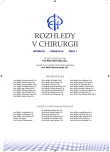-
Medical journals
- Career
Colorectal cancer in the elderly
Authors: J. Hoch 1; M. Bláha 2; D. Malúšková 2
Authors‘ workplace: Chirurgická klinika 2. LF Univerzity Karlovy a FN Motol, Praha přednosta: prof. MUDr. J. Hoch, CSc. 1; Institut biostatistiky a analýz, Masarykova univerzita, Brno ředitel: doc. RNDr. L. Dušek, Ph. D. 2
Published in: Rozhl. Chir., 2016, roč. 95, č. 1, s. 13-18.
Category: Original articles
Overview
Introduction:
High incidence of colorectal cancer in the Czech Republic is an actual and demographically significant health issue. Half of all of the patients is older than 70 years. Both surgical and non-surgical treatment options in this group of patients depend on factors that are difficult to measure only by current oncological and anesthesiological classifications (cTcNcM, ASA). The objective of this paper is to measure the impact of age on the use of various treatment modalities within the protocol and their results, and also to suggest alternative options for therapy tolerance assessment.Methods:
Analysis of data over a five-year period from the NOR database prepared by the Institute of Biostatistics and Analyses, Masaryk University.Results:
In all parameters a difference was demonstrated between patients below the age of 70 and those above the age of 70 years. Older patients were disadvantaged. Only 11.2% of patients younger than 70 years were not treated, whereas 25.2% over the age of 70 years were not treated.Conclusion:
A complex geriatric examination could improve the indication process in various treatment modalities, including surgery.Key words:
colorectal cancer – elderly – treatment – geriatric assesment
Sources
1. van Leuwen BL, Påhlman L, Gunnarsson F, et al. The effect of age and gender on outcome after treatment for colon carcinoma. A population-based study in the Uppsala and Stockholm region. Critical Reviewes in Oncology/Hematology 2008;67 : 229−36.
2. Egenwall M, Schubert Samuelsson K, Klarin I, et al. Management of colon cancer in the elderly: a population-base study. Colorectal Disease 2014;16 : 433−41.
3. Kaźmierska J. Assessment of health status in elderly patiens with cancer. Rep Pract Oncol Radiother 2012;18 : 44 – 8.
4. Schiphorst AH, Pronk A, Borel Rinkes IH, et al. Representation of the elderly in trials of laparoscopic surgery for colorectal cancer. Colorectal Disease 2014;16 : 976−85.
5. Hamaker ME, Vos AG, Smorenburg CH, et al. The value of geriatric assessments in predicting treatment tolerance and all-cause mortality in older patients with cancer. Oncologist 2012;17 : 1349–9.
6. Balducci L, Extermann M. Management of cancer in older persons: a practical approach. Oncologist 2000;5 : 224–37.
7. Kaźmierska J. Do we protect or discriminate? Representation of senior adults in clinical trials. Rep Pract Oncol Radiother 2013;18 : 6–10.
8. Fried LP, Tangen CM, Walston J, et al. Frailty in older adults: evidence for a phenotype. J Gerontol A Biol Med Sci 2001;56: M146−M156.
9. Basche M, Baron AE, Eckhardt SG, et al. Barriers to enrolment of elderly adults in early phase cancer clinical trials. J Oncol Pract 2008; 4 : 162 cancer, 10.1200/ JOP.0842001.
10. Martínek L, Dostalík J, Guňka I, et al. Ist das Alter ein Risikofaktor für laparoskopische kolorektale Operationen? Zentralbl Chir 2011;136 : 264−8.
11. Petera J, Dušek L. Nádorová onemocnění ve starším věku. Klin Onkol 2014;27 : 210−8.
Labels
Surgery Orthopaedics Trauma surgery
Article was published inPerspectives in Surgery

2016 Issue 1-
All articles in this issue
- Development of tracheal resection technique – our experience
- Short-term results of minimally invasive pectus excavatum repair in adult patients
- Transanal endoscopic microsurgery (TEM) − our experience
- Granulomatous inflammation in differential diagnosis of hepatobiliary malignancy
- Extragenital malignant Müllerian carcinosarcoma with invasion of inferior vena cava – a case report
- Existing laparoscopic simulators and their benefit for the surgeon
- Colorectal cancer in the elderly
- Perspectives in Surgery
- Journal archive
- Current issue
- Online only
- About the journal
Most read in this issue- Granulomatous inflammation in differential diagnosis of hepatobiliary malignancy
- Transanal endoscopic microsurgery (TEM) − our experience
- Extragenital malignant Müllerian carcinosarcoma with invasion of inferior vena cava – a case report
- Development of tracheal resection technique – our experience
Login#ADS_BOTTOM_SCRIPTS#Forgotten passwordEnter the email address that you registered with. We will send you instructions on how to set a new password.
- Career

